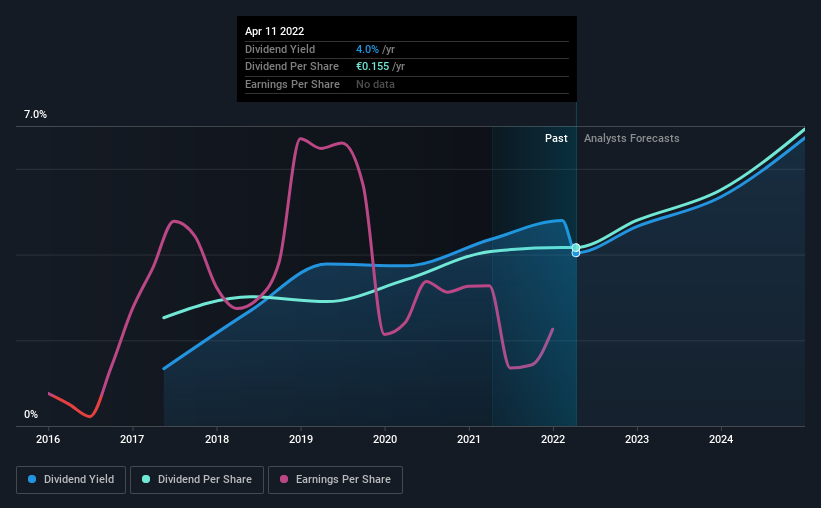
The board of LeoVegas AB (publ) (STO:LEO) has announced that it will be increasing its dividend on the 27th of May to kr0.42. This will take the annual payment from 4.0% to 4.1% of the stock price, which is above what most companies in the industry pay.
View our latest analysis for LeoVegas
LeoVegas Doesn't Earn Enough To Cover Its Payments
If the payments aren't sustainable, a high yield for a few years won't matter that much. Based on the last payment, LeoVegas' profits didn't cover the dividend, but the company was generating enough cash instead. Healthy cash flows are always a positive sign, especially when they quite easily cover the dividend.
Earnings per share is forecast to rise by 153.8% over the next year. If the dividend continues on its recent course, the company could be paying out several times what it earns in the next 12 months, which could start applying pressure to the balance sheet.

LeoVegas Is Still Building Its Track Record
The dividend's track record has been pretty solid, but with only 5 years of history we want to see a few more years of history before making any solid conclusions. Since 2017, the first annual payment was €0.094, compared to the most recent full-year payment of €0.15. This means that it has been growing its distributions at 11% per annum over that time. It is always nice to see strong dividend growth, but with such a short payment history we wouldn't be inclined to rely on it until a longer track record can be developed.
The Dividend's Growth Prospects Are Limited
Investors could be attracted to the stock based on the quality of its payment history. Let's not jump to conclusions as things might not be as good as they appear on the surface. It's not great to see that LeoVegas' earnings per share has fallen at approximately 4.9% per year over the past five years. Declining earnings will inevitably lead to the company paying a lower dividend in line with lower profits. Earnings are predicted to grow over the next year, but we would remain cautious until a track record of earnings growth is established.
LeoVegas' Dividend Doesn't Look Sustainable
Overall, we always like to see the dividend being raised, but we don't think LeoVegas will make a great income stock. In the past, the payments have been unstable, but over the short term the dividend could be reliable, with the company generating enough cash to cover it. We would be a touch cautious of relying on this stock primarily for the dividend income.
Investors generally tend to favour companies with a consistent, stable dividend policy as opposed to those operating an irregular one. Meanwhile, despite the importance of dividend payments, they are not the only factors our readers should know when assessing a company. Taking the debate a bit further, we've identified 2 warning signs for LeoVegas that investors need to be conscious of moving forward. Is LeoVegas not quite the opportunity you were looking for? Why not check out our selection of top dividend stocks.
If you're looking to trade LeoVegas, open an account with the lowest-cost platform trusted by professionals, Interactive Brokers.
With clients in over 200 countries and territories, and access to 160 markets, IBKR lets you trade stocks, options, futures, forex, bonds and funds from a single integrated account.
Enjoy no hidden fees, no account minimums, and FX conversion rates as low as 0.03%, far better than what most brokers offer.
Sponsored ContentNew: AI Stock Screener & Alerts
Our new AI Stock Screener scans the market every day to uncover opportunities.
• Dividend Powerhouses (3%+ Yield)
• Undervalued Small Caps with Insider Buying
• High growth Tech and AI Companies
Or build your own from over 50 metrics.
Have feedback on this article? Concerned about the content? Get in touch with us directly. Alternatively, email editorial-team (at) simplywallst.com.
This article by Simply Wall St is general in nature. We provide commentary based on historical data and analyst forecasts only using an unbiased methodology and our articles are not intended to be financial advice. It does not constitute a recommendation to buy or sell any stock, and does not take account of your objectives, or your financial situation. We aim to bring you long-term focused analysis driven by fundamental data. Note that our analysis may not factor in the latest price-sensitive company announcements or qualitative material. Simply Wall St has no position in any stocks mentioned.
About OM:LEO
LeoVegas
LeoVegas AB (publ) operates as a mobile gaming company in Malta, Sweden, and internationally.
Adequate balance sheet low.
Similar Companies
Market Insights
Community Narratives



